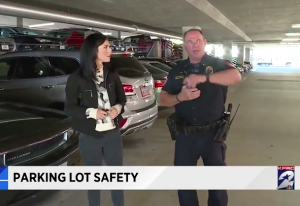
(Consumer Reports)
Parking facilities present inherent security challenges as they frequently occupy a large space with low levels of activity and numerous hiding places for would-be attackers. While parking facility owners are required by law to protect patrons from any foreseeable harm, Consumer Reports, urges patrons to take security precautions of their own.
- Choose Your Parking Spot Wisely: The closer to the mall entrance, the better. It is typically the most populated area of the parking lot. It is also the best lit.
- Lock It Up
- Out of Sight, Out of (the Criminal’s) Mind: Bags or expensive items of any ind should be put in the back and out of sight of would-be-criminals. A dark blanket or large towel can help conceal precious cargo.
- Have a Plan: Getting lost in the parking lot is a surefire way to make you easy prey. People are easily distracted when staring at a phone, so look occasionally, and be aware of your surroundings the rest of the time.
- Avoid Strangers: Be wary of strangers who approach you in the parking lot. Have your keys in one hand and your cell in the other in case you need to call 911.
Read a complete list of safety tips at Consumer Reports.
Victims of Parking Facility Violence: Know Your Rights
Parking lot and parking garage patrons have a right to feel safe and secure while on the premises of the establishment they are visiting. By law, property owners are required to protect all patrons legally on the premises from any foreseeable harm. For example, should a parking facility owner have knowledge of prior violence on or near property, they have a responsibility to implement additional security precautions to protect patrons and deter such crime. Should a parking facility owner fail in this critical responsibility, they may be held civilly liable for any injuries or wrongful deaths which occur as a consequence.
Can I Afford an Attorney?
Our Clients frequently come in concerned that they won’t be able to afford legal help. We believe everyone has a right to exceptional legal service. We represent our Clients on a contingency agreement, which generally means that no fees or payments are owed until and unless we recover. This means our interests are always tied to that of our Clients. Be sure to ask any potential personal injury attorney about their fee schedule and whether they represent Clientele on a contingency basis before signing a contract.
 The Legal Herald
The Legal Herald


